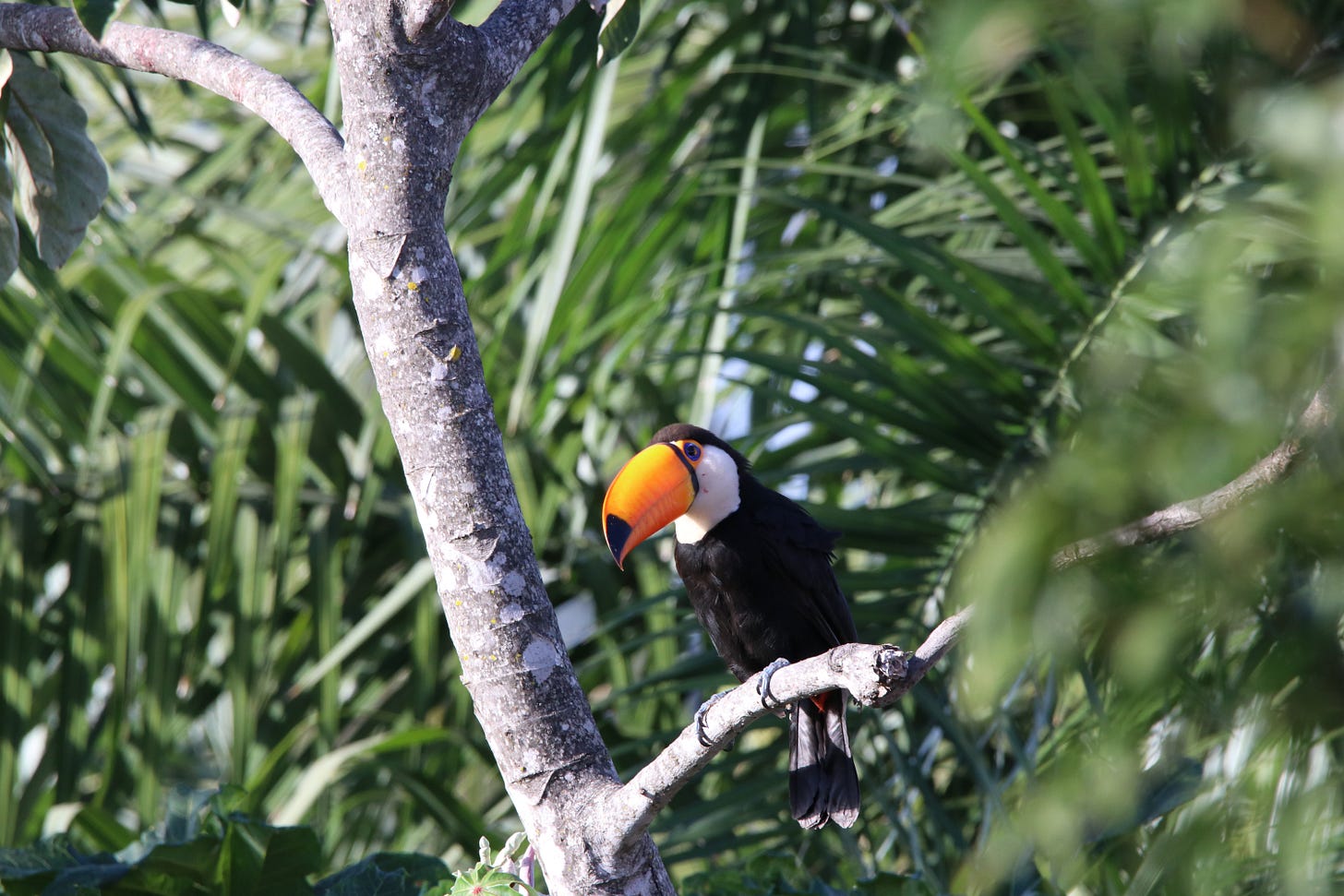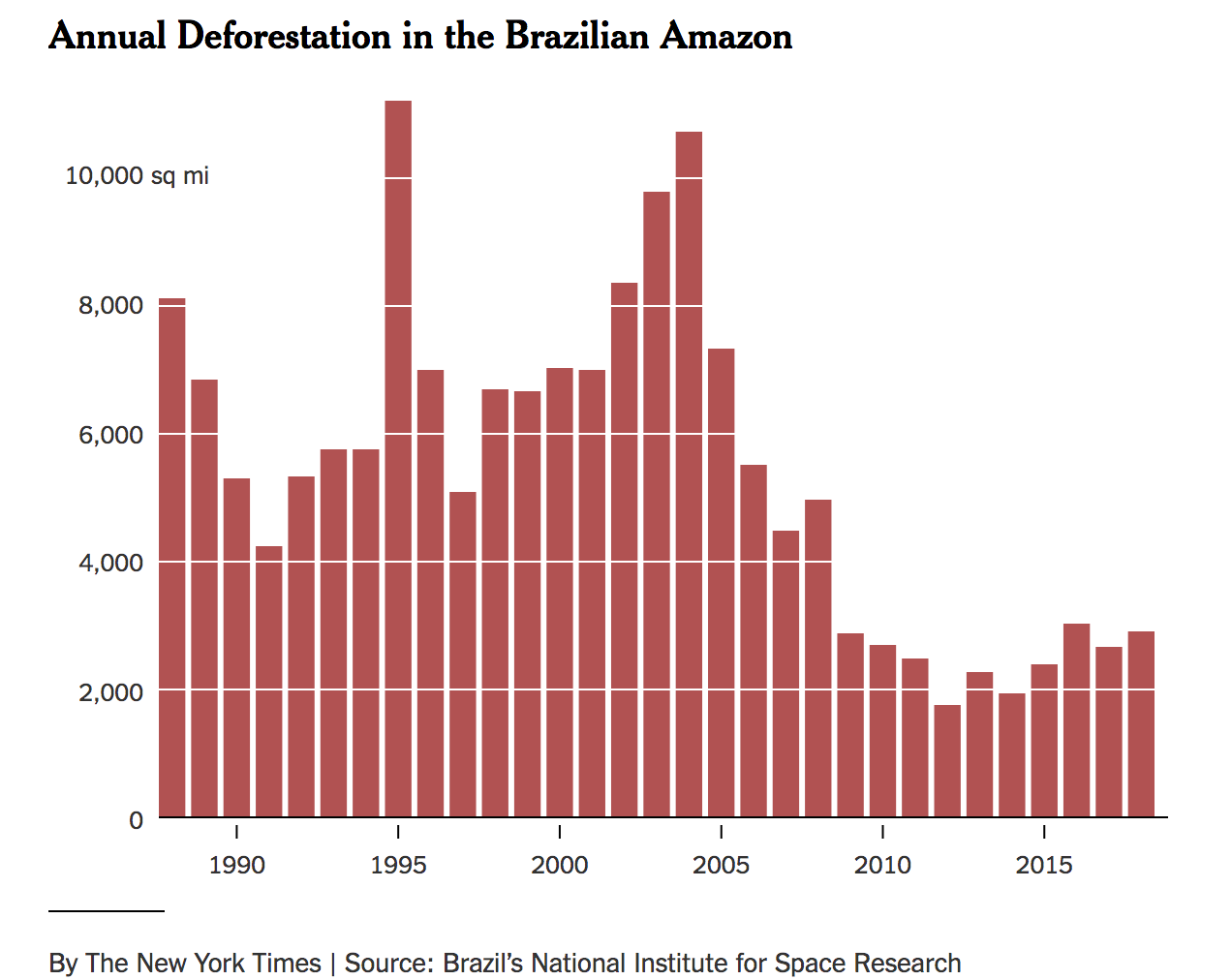
As wildfires continue to tear through California, burning more than 3.6 million acres so far this year, I want to return to the fires that caught the world’s imagination last year: the blazes in the Amazon. I’m sure you remember the alarming headlines, the celebrity tweets, the blazes in your feed. This year, the headlines are all about California. Unfortunately, this year it looks like even more of the Amazon is going up in smoke.
The Amazon fires are a little different than the ones in California, or Australia earlier this year, or the underreported “zombie fires” in Siberia currently, because a lot of them were intentional, set by humans to clear forest for grazing, agriculture, mining, or land development. They weren’t strictly caused by climate change but drier conditions meant they were worsened by it, and in turn the fires accelerated climate change by releasing all that stored carbon into the atmosphere.
Last year’s fires were made more stressful by some misinformation that was especially pervasive at the time, including misleading photos. There’s enough real stuff to be worried about, so let’s clear out some of the bunk, notably the oft-repeated idea that the Amazon is the “lungs of the Earth,” producing 20% of the world’s oxygen. Not true: plants use up almost as much oxygen as they produce, and oxygen is regulated mostly by geological forces.
But the Amazon is vital to the world’s ecosystem. If it’s any body part, it’s the heart, says Earth scientist Antonio Nobre. The plant life in the Amazon releases water vapour that recirculates around South America, sending rain and bringing cool air. This precipitation circulation is sometimes called “a flying river,” which is as cool as it sounds. This circulation is vital not only to preventing devastating drought in other areas but to sustaining the rainforest itself, which is at risk of turning into a savannah in our lifetime.
If the rainforest dries out, with it goes 10% of the world’s biodiversity. It’s home to 360 billion trees from up to 16,000 species. (By comparison? The U.S. is home to 72 species of trees, and Canada, 180. Cute.) Though the ocelots and tree frogs get all the photos ops, it’s also home to an incredible diversity of human beings: in Brazil alone there are 305 Indigenous groups speaking 274 languages, including 114 groups living in voluntary isolation from the world. All find their culture and very existence at risk. “They are basically burning our rights and our way of life,” Sônia Guajajara, the coordinator of the Articulation of the Indigenous People of Brazil, told The Atlantic.
The ancient trees of the rainforest are also a massive carbon sink, and burning releases all that carbon into the atmosphere, accelerating warming.
Unfortunately Brazil’s Trumpian far-right president Jair Bolsonaro considers the Amazon “open for business” — which means exploiting more of the forest for agriculture (beef and soy, and to a lesser extent wood and palm oil) and mining (including the proposed Canadian Belo Sun mine, which would be the country’s largest open-pit gold mine). Under his regime, he’s severely undermined Indigenous rights and softened enforcement of penalties for illegal fires, down by 20% in the first part of 2019. The spike in fires has been no coincidence.
Though no forest should be destroyed, it’s good to keep in mind that deforestation is at just 1/4 of its 2004 peak — the stronger protections put in place between 2004 and 2012 reduced deforestation by 70%, and many of those protections hold strong. In the mid-aughts, Brazil was actually a land conservation leader.

It’s reassuring that good policy and enforcement can have a profound and prolonged effect, and one leader, thankfully, can’t so easily undo a decade of progress. But even so, the Amazon needs our continued attention, even when the fire isn’t in the headlines. So what can we do from our own homes to ensure that the rainforest doesn’t only live on in the Rainforest Café^TM?
Support rainforest protection NGOs and Indigenous land defenders
In grade four, my class raised money to “buy” an acre of rainforest to protect it, and looking back, I still wonder about it. Is there an acre somewhere in the name of Mrs. Goodwin’s grade fours? I somehow doubt it. But giving money to organizations on the front line to protect an acre can actually work. Amazon Watch and Rainforest Action Network both work with Indigenous communities to implement effective local solutions. You could also donate to a local firefighting brigade. For maximum effect, set up a recurring donation.
If you don’t have money to give now, you could sign this Rainforest Action Network petition to help keep major companies accountable to their deforestation goals.
Say adios to South American beef
We know that beef generally comes with a high climate price tag, but South American beef is among the worst. According to a report out of Yale, 80% of current Amazon deforestation is because of cattle farming and around 25% of the world’s beef comes from Brazil. In Canada, the supply of South American beef is limited, though last year we were exploring a free trade deal with the Mercosur bloc (which includes Brazil, Argentina, Paraguay, and Uruguay) that would see a massive increase in beef from those countries. Though the Canadian government says no talks have happened since July 2019, the Brazilians recently published a report touting the value of a Canadian deal, and Greenpeace has a recent petition to keep South American beef off the table.
Even beef that is certified deforestation-free can be suspect: often cows are simply finished on land that meets environmental standards, but they could have been born and fattened on newly cleared forest.
All of this, of course, is hard on farmers trying to make ends meet (and make end meat?), so shutting down imports isn’t the end of the story. As in the case of oil and gas workers, a just transition is important, so people can earn a secure living without setting the actual forest on fire.
Plant while you putter online
I’ve already made the argument for switching your default search engine to Ecosia, but I bring it up again because it’s such an easy change that illustrates how little actions add up. Ecosia has planted over 3.5 million trees in Brazil and signed contracts for another 9.5 million more. They’ve also invested €318,712 in firefighting — since old trees > new trees. I love knowing that I’m doing some good as I alt-google thinkpieces on Zac Efron.
TL;DR
The Amazon rainforest isn’t the lungs of the Earth or a major source of oxygen, but it’s vital to creating and circulating rain, storing carbon, preserving biodiversity, and to the continued existence of hundreds of Indigenous Peoples.
Avoid South American beef, which is the #1 reason for rainforest deforestation.
Forget “buying” an acre: give that money to organizations that fight to protect the land and work with and support Indigenous communities.
Doing your online searches with Ecosia will also plant trees and support rainforest firefighting efforts.
Wins of the Week
“We still talk in terms of conquest. We still haven’t become mature enough to think of ourselves as only a tiny part of a vast and incredible universe. Man’s attitude toward nature is today critically important simply because we have now acquired a fateful power to alter and destroy nature . . . but man is a part of nature, and his war against nature is inevitably a war against himself. Now, I truly believe, that we in this generation must come to terms with nature, and I think we’re challenged as mankind has never been challenged before to prove our maturity and our mastery, not of nature, but of ourselves.” — Rachel Carson
This week, I’m striking up the band to celebrate these excellent actions:
Kerry sent a letter (a real paper letter!) to her MP to say the COVID-19 recovery needs to be green and just if we want to have a liveable future. I’m going to do the same! Hot tip: letters to your MP don’t require postage. If you’re stuck on what to write, check out some online petitions for key points (here are examples from the David Suzuki Foundation and Greenpeace).
Crissy followed the advice in the newsletter on vampire power and put all her energy guzzling entertainment devices on one power bar. She’s also been watching DVDs over streaming for another solid win.
Shout out to my dad for his signature fridge-clearing spaghetti sauce that cracks down on food waste. He’ll put almost anything in there — the most recent one featured cut-up pepperoni sticks — but it always tastes good.
I know this week’s topic is heavy, so thanks for having the courage to look at the harder, more complicated stuff. There’s no shortage of hard stuff, but the act of learning, of looking, of talking about it is actually doing good. Maybe it’s only a tiny pinpoint of light, but enough of those lights start to look like stars.
xo
Jen
P.S. A quick moment for the other Amazon, and Jeff Bezos’s pledge to donate $10 billion dollars of his private fortune to climate change causes by the end of the summer. Well, summer’s over, and despite raking in record cash over the pandemic (including $13 billion in one day), guess how much Jeff-o has donated? Zero. To get really fired up, read Emily Aitken’s coverage at Heated and consider a conscious uncoupling from the company named for a river it’s helping destroy.
Five Minutes for Planet is written by me, Jen Knoch, and edited by the incredible Crissy Calhoun. Opening photo by Marcus Dall Col on Unsplash.




Not only does your dad's spaghetti sauce help clear out the fridge, so does his chili. I enjoyed a bowl of it last week and it was delicious!